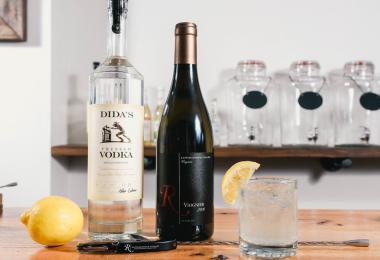Covid-19 has begun to redefine how business is done, and the wine industry is no exception. Social distancing is one of the most noticeable effects of the pandemic, as trade shows, nightclubs and wine bars become off limits.
But rather than wait for things to get back to normal, many wine professionals are embracing change and moving their events online, from wine tastings to wine fairs.
Wine goes virtual
“I bumped into an article online where they had a study talking about the consequences of things in China,” said Irene Graziotto, international press officer for Studio Cru, a wine communication agency in Vicenza, Italy. “People were doing virtually what they couldn’t do physically.”
It wasn’t long before similar initiatives began to show up elsewhere—as lockdowns and quarantines proliferated, social drinking groups exploded onto the internet through WhatsApp, WeChat, Facebook and other social networks. Restaurant chefs began offering virtual consulting classes for home cooks, and online education surged.
Trade shows have also moved online. According to Meet Expo, more than 1,700 expos and trade shows worldwide have been cancelled or postponed in the wake of the coronavirus. For the wine industry, the cancellation of ProWein – the world’s largest wine trade fair – was a devastating blow, as it’s where nearly 7,000 producers and producer organisations do business with more than 60,000 international visitors.
Creating a virtual space that can mimic shows like ProWein is far from reality—even a virtual reality. But organisations like Studio Cru have experimented with ways to fill the void, and keep a connection to their customers. The first thing they did was contact their scheduled appointments, to tell them the tastings were still going to happen.
“We scheduled everyone’s tasting at the same time as their ProWein tasting,” to keep the feeling that the tastings were as close to what they would have been at the venue itself, said Graziotto.
Graziotto and her colleague Alessandra Zambonin arranged for wine samples to be shipped around the world, so they could do tastings in real time, as they would have been in person in Düsseldorf. They decided to use Skype as a platform for the tastings, because most people are familiar with it.
As with most new ventures, not everything went smoothly. “For example, not all of us have a router at home, so we basically had to work with what we had,” said Graziotto. Not having the most up-to-date equipment meant that transmission quality sometimes suffered, particularly when there were more than two or three people streaming a video call.
Graziotto also found resistance to the use of technology because some individuals were either unfamiliar with it, or felt that there was a measure of intimacy they were uncomfortable with. “With a webcam, people are seeing into their houses, and they had to get past that intimacy wall,” said Graziotto.
But there turned out to be unexpected benefits from working in the digital world. “There are subtitles” on Skype, said Graziotto. “That was very useful, especially for people that are not fluent in another language.”
While she can see that it’s a new way of working that people need to become used to, she believes it is opening up possibilities. “I would say that this is going to force people to think about other possibilities, along with the more traditional ones they prefer.”
New ways to connect
While the Studio Cru tastings were held via Skype, the new digital star is Zoom, a virtual meeting and webinar platform originally developed for business. It has quickly become the go-to place for friends and family to meet and hold digital social gatherings. According to the New York Times, on March 15, 2020—Zoom’s busiest day—over 600,000 people downloaded the app.
Zoom has a number of free features that have made it attractive to a wide group of users, including the way it lets the moderator handle participants, including audience members – people can raise their virtual hands to interject, can type questions via a chat box, or can type comments that are seen by all participants as a meeting, webinar or online course progresses. The moderator can mute and unmute participants and bring them in and out of the discussion as needed. The possibilities are enormous – Fast Company reported that Theatre Unleashed, a Los Angeles-based company, recently premiered a new play online. Originally intended to be a live reading, it turned into a digital performance when the lockdown in L.A. shuttered the theatre. Instead, six actors connected across Zoom and performed the play for a listening audience.
A little farther north, in California’s Napa and Sonoma valleys, wine estates are also using Zoom to conduct virtual tastings. St. Supéry Estate Vineyards started an online tasting club to help connect with their customers during the coronavirus crisis. Each Thursday one of the St. Supéry winemakers lead a wine tasting with the participants. Other estates such as Rombauer Wines, Balletto Vinyards, and Francis Ford Coppola Winery are offering similar virtual tastings.
But, thanks to lockdowns and social distancing, more traditional apps like Faceboook, Instagram and WeChat, have also seen an increase in use, as people seek ways to connect with one another. Another app making a name for itself is GoToMeeting, created by a company called LogMeIn, which lets up to 250 people get together at once. Another feature is that participants can share their screens with one another – and the software can even transcribe the meeting. So far, it doesn’t appear to have had any take-up in the wine industry, though The Florentine, a magazine created for English speakers in Florence, has already created a series of virtual community events for its members. As with most advanced meeting apps, it comes with a modest fee to use.
Apps for facilitating social contact aren’t the only ones booming. According to a report by Forbes, the arrival of the coronavirus has resulted in a 72% rise in the use of financial technology across Europe. This may seem logical—more people ordering things online means more payments through fintech apps—but it is also a sign of the changing times. Fintech apps are also used for online and mobile banking, money transfers, and many other financial transactions traditionally done at a brick-and-mortar location—places like a winery, or wine store.
Of course, it’s one thing to hold a one-to-one, or small group tasting over Skype – but how useful is the technology for larger scale gatherings?
Virtual at scale
Realising that the cancellation of ProWein would be devastating for wine producers in Portugal, Andre Ribeirinho, the founder of the Adegga online wine store in Lisbon, Portugal, decided to hold an online event where Portuguese producers could meet with clients, arrange meetings, and get into discussions with industry professionals. “We wanted to show that Portuguese wine can react fast to changes in the market,” he said.
The result was Portugal Wine Week, a two-day online event held on the days that ProWein would have taken place. Their studio was a converted hotel room on a busy street corner, and their broadcasting equipment was made up of technology they mostly already had. “We used two iPhones, three computers, and I think we had four microphones,” said Ribeirinho. He chose Zoom as their platform.
The original idea was to get all the producers together, but while Ribeirinho’s team was in the process of creating the event, lockdowns began. Their idea morphed into two days of seminars broadcast from the homes of different wine growers from different parts of Portugal.
“We had almost 80 producers participating, and we had 300 professionals that signed up,” said Ribeirinho. The goal of the project, to promote Portuguese wine to the world, was more than met – 290 of the 300 participants were from outside of Portugal.
Afterwards, Ribeirinho told Meininger’s he didn’t believe virtual events would replace live ones. “Wine tasting doesn’t become interesting just because it’s on Instagram.” Instead he sees the line between offline and online blurring, with virtual events becoming more integrated with live ones – complementing, rather than competing with them. He isn’t the only one that sees the lines blurring.
Zambonin from Studio Cru in Italy agrees that these digital changes are likely to become a more permanent part of everyone’s lives. “I think you can add poetry to this technological platform, thanks to the people involved in it,” she said. “If everyone in their own room, or vineyard or cellar, can communicate their emotions and information, it can work.”
Jason Sych
This article first appeared in Issue 2, 2020 of Meininger's Wine Business International magazine, available online or in print by subscription.








